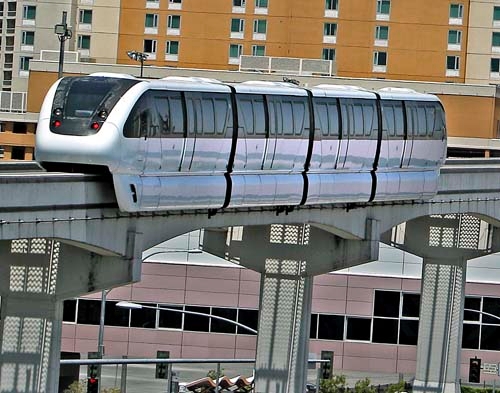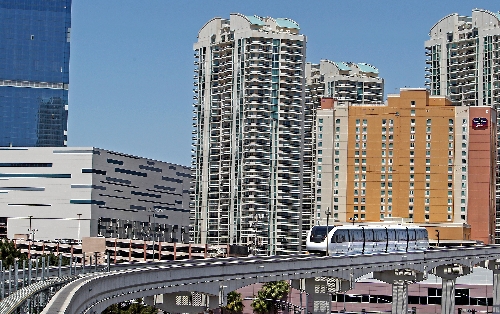Las Vegas Monorail’s survival in doubt
The Las Vegas Monorail has filed a bankruptcy reorganization plan that would wipe out more than 90 percent of its $658.8 million debt but leaves hurdles to continued operation until the end of the decade.
Investors with $451.5 million in senior bonds, which were sold in 2000 to purchase the original monorail and expand it to 3.9 miles, would exchange their holdings for three sets of IOUs totaling $44.5 million. Each set will have different terms.
Two other tiers of bonds with a lower repayment priority, totaling $207.3 million, would be erased. Because the monorail's value has been set at a small fraction of the senior bonds, the others are considered worthless under bankruptcy law.
The plan raises the potential payout on the senior bonds from the $18.5 million the monorail first proposed in August, an opening proposal that drew sharp objections from the bondholders. Since then, the two sides have negotiated revisions that will face their first court hearing on May 25.
The board of directors would expand from five to seven, with the new seats designated for bondholder representatives.
Attorney Bruce Woodbury, who sits as a director of the nonprofit monorail, said further alterations could come.
"This is not a final agreement but it is close," he said, referring to the message at a Wednesday board meeting that immediately preceded the court filing. "The current plan reflects a lot of the concerns of the creditors."
Attorneys for the bondholders could not be reached for comment.
Monorail management refused to comment.
However, even if U.S. Bankruptcy Court Judge Bruce Markell approves the plan, which would probably come this summer, this is only the first step in ensuring the monorail's long-term survival.
According to the disclosure statement, the legally required explanation of the plan, the monorail will not generate enough revenue to repay the stripped-down debt and cover a major overhaul looming in 2019. One consultant estimated the bill to replace fare collection equipment and platform doors at $23.1 million, while another believes more work will be needed at cost of $77.5 million.
Remaining in operation beyond then, the document said, would require "obtaining additional capital through the expansion of the existing monorail system, obtaining federal infrastructure funds or grants or through private financing or investment."
For several years, monorail leaders have thought that lengthening the line to McCarran International Airport from the current southern terminus at the MGM Grand was necessary to draw enough passengers to make the finances work without government subsidies. For several years, passenger counts and revenues have dwindled.
"We're working very hard on a plan that would allow expansion to the airport and possibly additional stations," Woodbury said. "We're hopeful we can accomplish this."
But longtime critics of the monorail's route, running roughly parallel to the Strip to the east, doubt many airline passengers would want to walk from a station to a hotel lobby, especially properties on the west side of the Strip.
The monorail began in 1993 as a link between MGM Grand and Bally's, but was turned over to the current nonprofit a decade ago. The premise that it would be the only private transit line in the country to pay for itself was quickly undermined when operations restarted in 2004, as ridership and revenue projections turned out to be much higher than reality.
The monorail has covered operating costs but fell well short of paying off the bonds. From 2007 through 2010, revenues dropped 25 percent to $23.6 million in operating income slumped 65 percent to $4.3 million. Passenger counts went down by a third to 5.2 million.
Besides what they would get from the monorail, bondholders are in line to receive $111 million in cash and $98.5 million in notes and bonds from Ambac Assurance Corp. Ambac insured the bonds against default, but numerous financial problems drove it into receivership last year. The payments would flow following approval of a settlement proposed in that case.
Contact reporter Tim O'Reiley at toreiley@reviewjournal.com or 702-387-5290.


















